

Rootless Cosmopolitan – By Tony Karon. I recently found this piece I wrote for TIME.com in October of 2000, trying to come to grips with the reasons for the failure of the Israeli-Palestinian peace process.
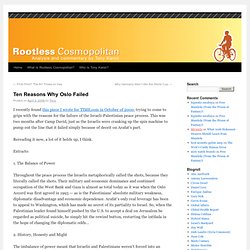
This was two months after Camp David, just as the Israelis were cranking up the spin machine to pump out the line that it failed simply because of deceit on Arafat’s part. Rereading it now, a lot of it holds up, I think. Extracts: 1. World Report 2013: Israel/Palestine. Serious violations of international human rights and humanitarian law continued in 2012 in Israel and in the West Bank and Gaza.
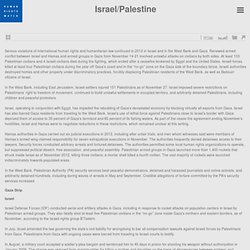
Renewed armed conflict between Israel and Hamas and armed groups in Gaza from November 14-21 involved unlawful attacks on civilians by both sides. At least 103 Palestinian civilians and 4 Israeli civilians died during the fighting, which ended after a ceasefire brokered by Egypt and the United States. Israeli forces killed at least four Palestinian civilians during the year off Gaza’s coast and in the “no-go” zone on the Gaza side of the boundary fence. Israeli authorities destroyed homes and other property under discriminatory practices, forcibly displacing Palestinian residents of the West Bank, as well as Bedouin citizens of Israel.
In the West Bank, including East Jerusalem, Israeli settlers injured 151 Palestinians as of November 27. Gaza Strip. Welcome to Beyond Images - Perspectives on the Arab-Israeli Conflict. This Briefing outlines the arguments used in Israel for and against Israeli settlements in the West Bank and Gaza.
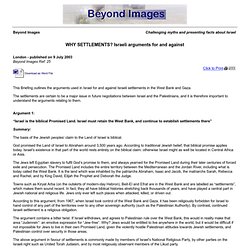
The settlements are certain to be a major issue in future negotiations between Israel and the Palestinians, and it is therefore important to understand the arguments relating to them. Argument 1:
Views on the Arab–Israeli conflict. The Arab-Israeli conflict is the result of numerous factors.
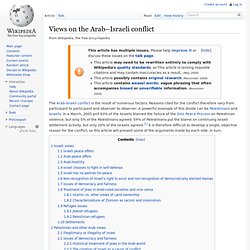
Reasons cited for the conflict therefore vary from participant to participant and observer to observer. A powerful example of this divide can be Palestinians and Israelis. In a March, 2005 poll 63% of the Israelis blamed the failure of the Oslo Peace Process on Palestinian violence, but only 5% of the Palestinians agreed. 54% of Palestinians put the blame on continuing Israeli settlement activity, but only 20% of the Israelis agreed.[1] It is therefore difficult to develop a single, objective reason for the conflict, so this article will present some of the arguments made by each side, in turn.
Israeli views[edit] There is not a single "Israeli view"; there are many different Israeli views, which differ widely. Israeli peace offers[edit] In 2000, at Camp David, the Palestinians were offered a nominally independent state. Arab peace offers[edit] Arab hostility[edit] "If Israel embarks on an aggression against Syria or Egypt.... Israeli–Palestinian peace process. The UN Partition Plan The peace process in the Israeli–Palestinian conflict has taken shape over the years despite the ongoing violence which has prevailed since the beginning of the conflict.[1] Since the 1970s there has been a parallel effort made to find terms upon which peace can be agreed to in both the Arab–Israeli conflict and in the Palestinian–Israeli conflict.
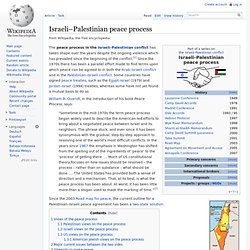
Some countries have signed peace treaties, such as the Egypt–Israel (1979) and Jordan–Israel (1994) treaties, whereas some have not yet found a mutual basis to do so. William B. U.S Foreign Aid to Palestine. U.S Forgeign Aid to Israel. Foreign relations of the Palestine Liberation Organization. UN groupings criticise Israeli settlement activities. 20 December 2011Last updated at 22:39.
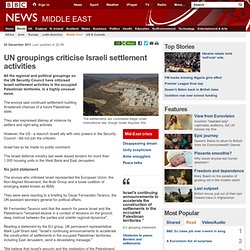
The UN Vote and Palestinian Statehood. The Palestinians' effort to attain international statehood recognition at the United Nations in September is aimed at enhancing their leverage in future negotiations with Israel.
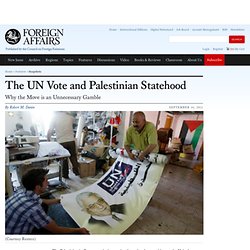
In a candid May 16 op-ed in the New York Times, Mahmoud Abbas, the president of the Palestinian Authority (PA) and chair of the Palestine Liberation Organization (PLO), acknowledged as much. "Palestine would be negotiating from the position of one United Nations member whose territory is militarily occupied by another," he said, "and not as a vanquished people. " Ironically, this effort, if successful, could achieve the very position Palestine could have attained long ago at a much lower price. Phase II of the 2003 Quartet Roadmap for Peace offered the option of creating "an independent Palestinian state with provisional borders" as a stepping stone to a negotiated permanent final-status agreement.
By focusing on state-building, the PA had improved living conditions and strengthened security for Palestinians. History of failed peace talks.
The Palestine Rejection of Camp David. Saturday, May 18, 2002 NEW YORK: So does Yasser Arafat really want peace?

In several columns I have sneered at the Palestinian leader and reiterated the common view that he had rejected very generous peace deals proffered by former Prime Minister Ehud Barak of Israel. That is a nearly universal understanding in the West, expressed by everybody from Henry Kissinger to the cocktail party set. But, prompted by various readers, I've been investigating more closely and interviewing key players. This is what I found: It is clear that in July 2000 at Camp David, Barak and President Bill Clinton suggested a courageous, path-breaking peace plan permitting a Palestinian state with a capital in Jerusalem.
The notion that the failure of Camp David was completely Arafat's fault arose when Clinton publicly said as much, partly in an effort to bolster Barak's re-election prospects. Arafat foolishly never bothered to offer a counterproposal. Violations of International Law. The PLO Charter. Below is the Palestinian National Covenant, the official charter of the Palestine Liberation Organization (PLO).
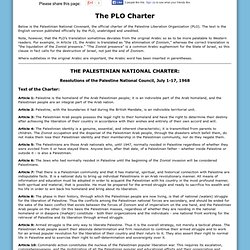
The text is the English version published officially by the PLO, unabridged and unedited. Note, however, that the PLO's translation sometimes deviates from the original Arabic so as to be more palatable to Western readers. Protection of Civilian Persons in Time of War. Why the Israeli-Palestinian Peace Talks were Set-up to Fail. Israeli Prime Minister Benjamin Netanyahu and US President Barack Obama met to discuss the Israeli-Palestinian Peace talks.
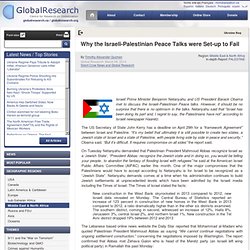
However, it should be no surprise that there is no optimism in the talks. Netanyahu said that “Israel has been doing its part and, I regret to say, the Palestinians have not” according to Israeli newspaper Haaretz. The US Secretary of State John Kerry has a deadline on April 29th for a “framework Agreement” between Israel and Palestine. “It’s my belief that ultimately it is still possible to create two states, a Jewish state of Israel and a state of Palestine, with people living side by side in peace and security,” Obama said. “But it’s difficult. New construction in the West Bank skyrocketed in 2013 compared to 2012, new Israeli data revealed on Monday. For the Palestinians to recognize Israel as a ‘Jewish State’ would be devastating politically.